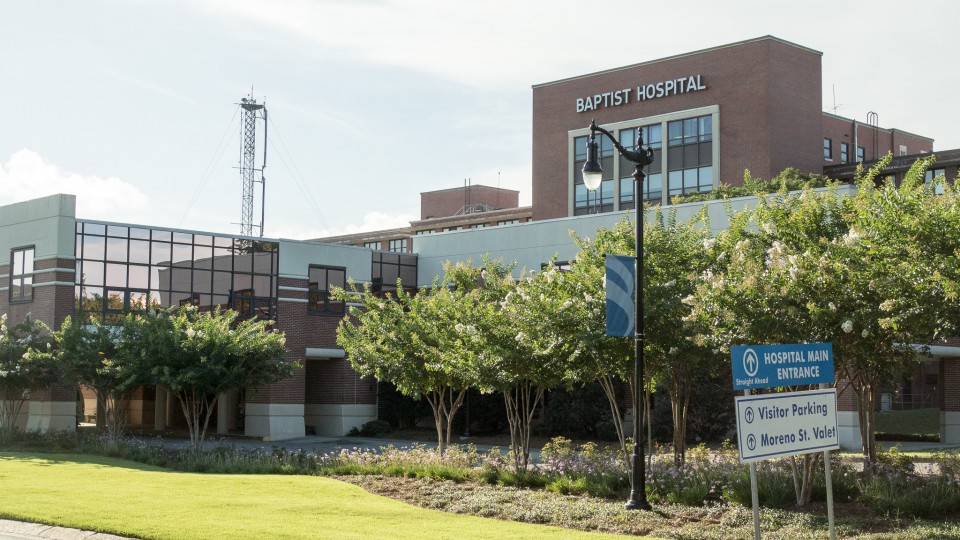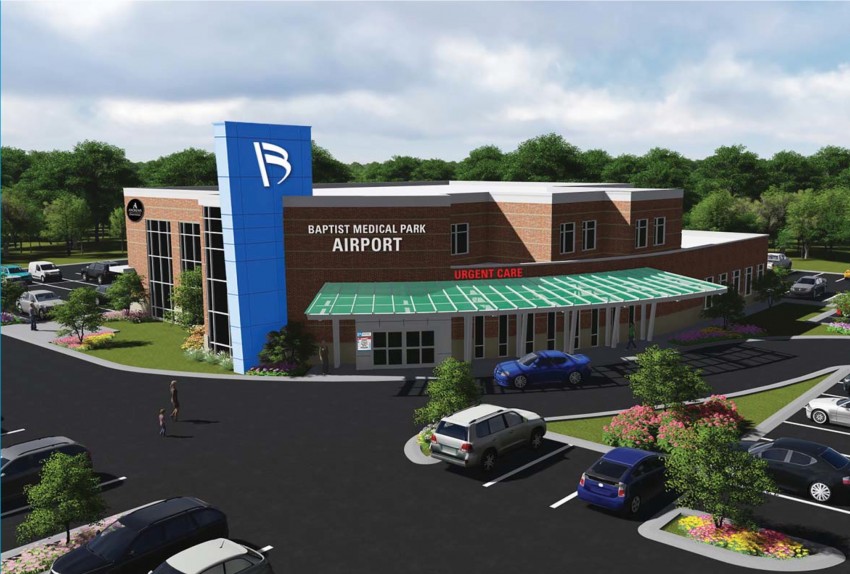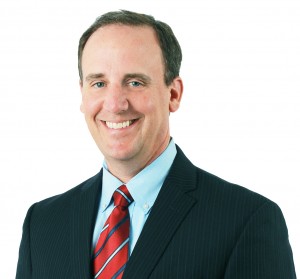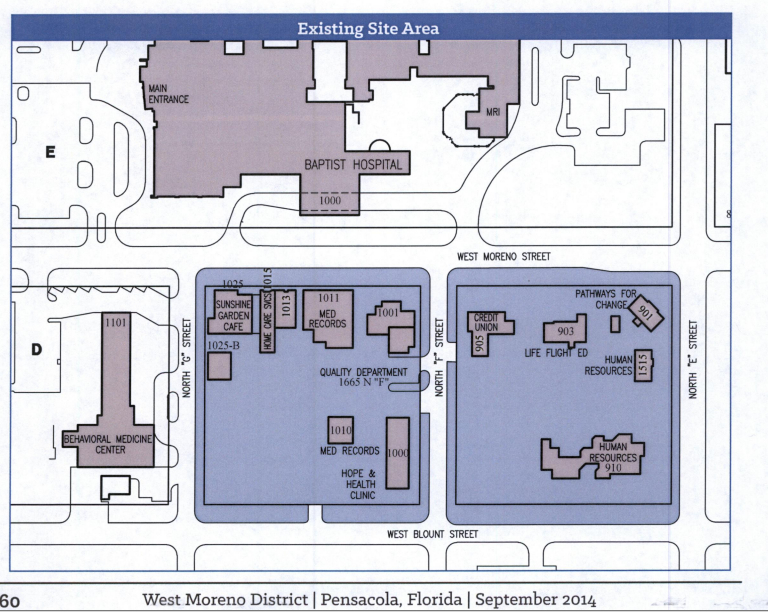Baptist Health Care's expansion fever
- February 9, 2016
- / Shannon Nickinson
- / economy

Baptist Hospital at E and Moreno streets in Pensacola. Photo credit: Phil Nickinson
Baptist Health Care is coming to you.
The healthcare company’s announcement that $6 million medical park opening in northeast Pensacola is part of a strategy to increase access to care in the community. It is one that president and CEO Mark Faulkner says he feels is crucial for the hospital system to undertake.

Renderings of what the $6 million Baptist Medical Park proposed at the Pensacola International Airport will look like. Credit: Baptist Health Care.
“Access to primary care is a challenge in our community,” Faulkner says. “Health care has been focused on what’s good on the providers instead of what’s good for the patients. This is a way to move decisions points back into the hands of the patients.”
The planned urgent care and sports medicine clinic near Pensacola International Airport is also a way for the Baptist brand to get a foothold in what has been Sacred Heart Health System territory. It is slated to open in 2017.
Baptist’s facilities have been centered at the downtown campus at E and Moreno streets and at the Medical Park on Nine Mile Road and University Parkway.
“It’s a desert of Baptist services in that area, and it seemed a logical, very visible location for us,” Faulkner says. “We evaluated a number of available parcels and buildings that could be redesigned” before settling on the parcel at the airport.
The clinic will offer primary care, walk-in care, care for people with chronic conditions, minor injuries and primary sports medicine — an extension of Baptist’s partnership with the Andrews Institute for Orthopaedics and Sports Medicine.
With Roger Scott Sports Complex just a stone’s throw from the site, there is likely a built in audience for such services.
“We are owned by this community; I’m accountable to this community,” Faulkner says. “I have a strong vested interest in focusing on what’s best for the community. These projects are exciting because they contribute to Baptist but they contribute to the community as well.”
The YMCA partnership
It is part of a building boom in the Pensacola healthcare market as well. Sacred Heart Hospital is working on construction of a new children’s hospital.
Health care is a huge driver of the Pensacola metro economy.
It is according to data from the University of West Florida’s Haas Center for Business Research and Economic Development one of the top three sectors of the local job market.
In 2015 it accounted for some 21,160 jobs — some 14 percent of the overall total.
“The future is going to be less about a major central campus and more about decentralized access to services,” Faulkner says. “We try to marry up those services based on demand and needs of the community and available partners.”
That’s part of the reason for the Baptist partnership with the YMCA of Northwest Florida to put health services into the new Bear Levin Studer YMCA, now under construction at Jefferson and Intendencia streets.
That $15 million project will give the Y and new flagship main location to replace the aging, outdated, non-ADA compliant Palafox location with a 52,000 square foot facility will boast state-of-the-art wellness and fitness spaces and allow one of the largest providers of childcare in the metro area to improve and expand its services.
Baptist and the Andrews Institute again will offer wellness, rehab and other services at the Y.
“They are focused on wellness, we focus on health,” he says. “We’re trying to mend people, and so are they and this will create a good stream of continuity. (You’ll have) wellness, community education, access and occupational rehab working right with the same assets.”
At the groundbreaking in August, Faulkner framed the Y project as a matter of corporate responsibility in a community that ranks near the bottom of many public health indexes.
“As the only locally owned not-for-profit health system in the community, this is our responsibility,” Faulkner said then. “We own that.”
In deaths from Alzheimer’s disease, stroke, cardiovascular disease, cancer and a host of other issues, we lead other metropolitan areas in Florida.
We smoke too much, we are overweight, we are asthmatic, we have higher STD rates and teen births. We use the emergency room too frequently for things that aren’t emergencies, because too many of us don’t have access to primary health care.
Census data indicates that some 48,280 Escambia County residents don’t have insurance.
“It really is an access issue,” Faulkner says. “They don’t have access to care. They put off their care. They walk with that pain, they don’t manage their diabetes so when they do access care, it’s late and expensive in the process.
“Ii wish we’d see a little more movement in Tallahassee on this,” Faulkner says. “It’s costing the state, it’s costing employers money. The business communities are recognizing this is a hidden cost.”
Estimates from the Partnership for a Healthy Community, which aims to raise awareness of public health issues in the Pensacola metro area, are that obesity and smoking alone cost employers in Escambia and Santa Rosa counties $600 million a year in health care costs.
Live Work Learn Play
Baptist also is reaching out into the community around its Westside neighborhood.
The hospital, with contributions from the City of Pensacola and Escambia County, are paying Canadian firm Live Work Learn Play Inc. to help craft a concept for a new office building that includes retail and open space that will fit into the neighborhood’s needs, too.
Brett Aldridge, executive director business development, planning and partnerships for Baptist, said the project remains in the feasibility study phase.
“At the conclusion of the joint feasibility study with the City and County, we will have further information that will help guide what options are available for a future project," he said.
The idea is to build the two block area south of Moreno Street into a space anchored by an office building the hospital will need anyway and supplemented with retail businesses that make sense for both Baptist and the neighborhood.
Previously released information about the project indicated that those businesses could be restaurants, as well as shops such as florists, medical supply stores and the like. Open recreation spaces that encourage walking, biking and playing would be a feature of the design as well.
“On any given day we 2,500 maybe 3,000 employees at the main campus as well as Lakeview,” Faulkner says. “We can have seeds of investment that can reshape neighborhoods. We just want to ride that wave.”


 CivicCon launches with a look at good growth in cities
CivicCon launches with a look at good growth in cities
 Building stronger brains one baby, one parent at a time
Building stronger brains one baby, one parent at a time
 SCI debuts commercial on Early Learning City
SCI debuts commercial on Early Learning City
 Entrecon: World class speakers and an opportunity to sharpen skills
Entrecon: World class speakers and an opportunity to sharpen skills
 PYP Quality of Life survey 2017
PYP Quality of Life survey 2017
 EntreCon Pensacola 2016: A look back
EntreCon Pensacola 2016: A look back
 Leadership tip: getting better employee takeaways
Leadership tip: getting better employee takeaways
 Leadership tip: be interested instead of interesting
Leadership tip: be interested instead of interesting
 Leadership tip: delivering difficult messages
Leadership tip: delivering difficult messages
 Brain Bags boost Arc, Early Childhood Court programs
Brain Bags boost Arc, Early Childhood Court programs